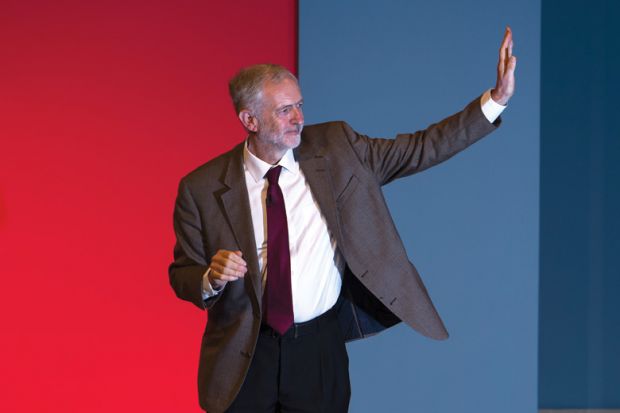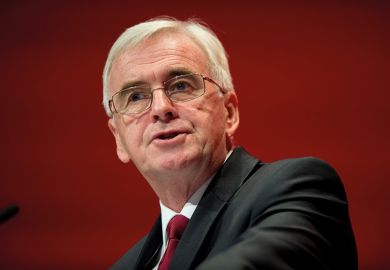Three things stand out about Labour’s pledge to end tuition fees in England, as set out in leaked versions of the party’s draft election manifesto: its factual errors; the absence, thus far, of a costing and funding plan for the policy; and a failure to argue a case for why greater public spending on higher education would benefit the nation.
Labour leader Jeremy Corbyn had made scrapping fees (set to rise to £9,250 this autumn) and reintroducing maintenance grants a keystone of his two successful leadership campaigns. Labour went into the 2015 election under Ed Miliband with a pledge to lower fees to £6,000.
Here is the section on higher education from the leaked Labour manifesto, as reported by the BBC News website:
“Labour believes education should be free, and we will restore this principle. No one should be put off educating themselves for lack of money or through fear of debt.
“There is a real fear that students are being priced out of university education. Last year saw the steepest fall in university applications for 30 years.”
There wasn’t a fall in applications “last year”. There has been a fall of 5 per cent in applications for undergraduate study at UK higher education institutions for courses starting in autumn 2017 (according to Ucas figures at the January deadline), which is not as big as the decline in 2012, the year in which fees were trebled to £9,000.
Work in a UK university? Please take part in our 2017 general election survey
The 2017 fall in applications is the second largest of only three declines in numbers at UK level since the current applications system began in 2002, according to Ucas.
That is significant, but it is not the “steepest fall in university applications in 30 years”. Type that phrase into a popular internet search engine and a 2012 Guardian article is the top result – the only result that closely refers to such an idea – headlined “UK university applications in ‘steepest fall for 30 years’”. This article is about predictions in the fall in applications for 2012 entry. And the article’s claim of it being the “steepest fall for 30 years” is based on a vice-chancellor’s estimate, not the official Ucas figures. As just mentioned, the current Ucas applications system only began in 2002.
Regardless of how sourced, the manifesto’s reference to application figures is inaccurate and misleading.
The manifesto continues:
“Since the Conservatives came to power, university tuition fees have been trebled to over £9,000 a year, and maintenance grants have been abolished and replaced with loans.
“The average student now graduates from university, and starts their working life, with debts of £44,000.
“Labour will reintroduce maintenance grants for university students and we will abolish university tuition fees.
“University tuition is free in many northern European countries, and under a Labour government it will be free in Britain too.”
Labour’s plans apply to England not “Britain”, given that education is devolved to the UK nations. While higher education is already tuition-free in Scotland, a Labour government in Westminster would have no power to change the system in Wales or Northern Ireland.
Then there are the important things the manifesto does not say.
There is no cost provided for the policy. London Economics, a consultancy that has prepared reports on the economics of higher education for the former Department for Business, Innovation and Skills, puts the cost of abolishing fees at £7.5 billion per student cohort, with a price tag of around £1 billion-£2 billion for reintroducing maintenance grants. Corbyn put the price of the two at £10 billion a year in his leadership campaigns.
Perhaps costings and a funding plan will come in the published version of the manifesto.
But this version also doesn’t answer the question of why ending tuition fees would benefit England as a nation, as distinct from removing debt from individual graduates, and thus requires public funding.
If Labour “believes education should be free”, that is presumably because it believes higher education has social and economic benefits for the nation, so should be regarded as a public investment.
There is no attempt to make this case on either social or economic levels. Labour could have pointed out the wealth of research that has found clear links between participation in higher education and improved levels of health and civic engagement for individuals, along with reduced crime rates, as a BIS literature review emphasised. Those benefits accrue not just for individuals, but their families and the whole of society.
The words “jobs” and “economy” do not feature in Labour’s attempt to justify billions of pounds of extra spending on universities. The catastrophic fall in part-time student numbers in recent years – a huge worry in terms of the economy’s future skills needs – is not mentioned.
There is a nebulous reference to university being tuition free in “many northern European countries”. If you wanted to come up with sharper points you could say that England now has the most expensive public universities in the world, according to the OECD; or that Europe’s richest economy, Germany, funds its universities through public spending and has ended its short-lived experiment with tuition fees.
The weakness of Labour’s argument on higher education is puzzling, given the importance Corbyn assigns to this policy and the fact that it has been long planned. Corbyn himself has had better stabs at arguing the case for the policy in his 2016 speech to a University and College Union event and interview with Times Higher Education.
Corbyn supporters see Labour’s new policy as a major shift in the national debate on higher education funding. But if sections are the press are successful in convincing the bulk of the public that the manifesto is a 1970s throwback, then the policy to end tuition fees is deeply tarnished too.
Perhaps the bulk of the audience for the manifesto won't be bothered by the details (or lack of) behind the pledge, but building a coherent argument would be of use in media battles over the plan.
If England’s major opposition party can’t convincingly argue the case for greater public investment in higher education, then that case is going nowhere.
Register to continue
Why register?
- Registration is free and only takes a moment
- Once registered, you can read 3 articles a month
- Sign up for our newsletter
Subscribe
Or subscribe for unlimited access to:
- Unlimited access to news, views, insights & reviews
- Digital editions
- Digital access to THE’s university and college rankings analysis
Already registered or a current subscriber? Login








